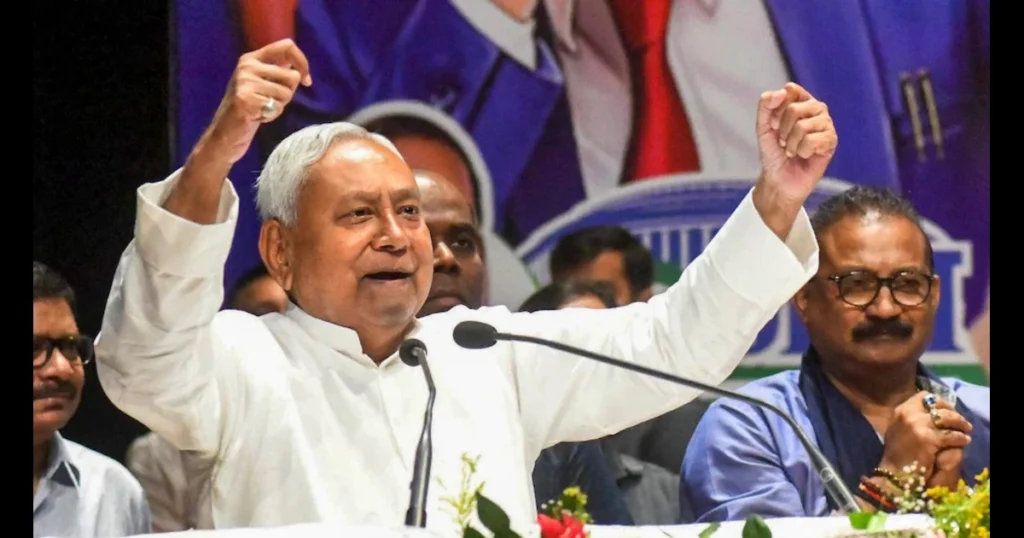Published on: July 27, 2025 at 10:28
In a landmark move toward social equality and welfare, Bihar Chief Minister Nitish Kumar announced the formation of the Bihar Safai Karmachari Commission on July 27, 2025. This commission is designed to address the longstanding challenges faced by sanitation workers across the state. Often marginalized and underrepresented, Safai Karmacharis have played a critical role in maintaining public hygiene, yet have lacked adequate support from government systems. This new initiative is a significant attempt to bridge that gap and bring dignity, representation, and welfare to these essential workers.
By forming a dedicated commission, the Bihar government aims to recognize sanitation workers as key stakeholders in the development of urban and rural infrastructure. The commission is also being seen as a politically smart move, coming ahead of the 2025 Bihar Assembly elections. However, the core of this effort remains rooted in social upliftment and institutional support.
What Is the Bihar Safai Karmachari Commission?
The Bihar Safai Karmachari Commission is a dedicated body that will monitor, evaluate, and propose welfare schemes and rights-based programs specifically for sanitation workers. Its purpose is not just administrative—it’s transformative. The commission will provide a structured mechanism to voice worker grievances, ensure fair representation, and drive actionable policy reforms. For a workforce that has traditionally been underrepresented, this commission offers a legitimate platform for their concerns to be heard and addressed.
Key features include:
-
It will consist of 1 Chairperson, 1 Vice Chairperson, and 5 members.
-
At least one member must be a woman or a person from the transgender community, reflecting the government’s focus on inclusion.
-
It will serve as an advisory body to recommend schemes and reforms for the socio-economic advancement of Safai Karmacharis.
-
It will function as a grievance redressal mechanism to handle exploitation, unsafe working conditions, and other issues faced by sanitation workers
Also Read:
Jagdeep Dhankhar Resignation: The Shocking Exit of India’s Vice President Explained
Why This Commission Is Important for Bihar
Sanitation workers in Bihar, like in many parts of India, have often worked in difficult, hazardous, and underpaid conditions. Despite being essential for public health, they have not received the recognition or institutional support they deserve. The formation of the Bihar Safai Karmachari Commission is a significant step in reversing this injustice. It marks a shift from neglect to empowerment, and from token gestures to systematic policy reform.
The commission’s importance lies in:
-
Recognizing sanitation workers as essential frontline contributors.
-
Providing institutional protection from exploitation and unsafe working conditions.
-
Promoting inclusivity by mandating representation of women and transgender members.
-
Serving as a watchdog for existing and future welfare schemes tailored for Safai Karmacharis
Bihar Safai Karmachari Commission: Benefits for Sanitation Workers
The direct beneficiaries of this commission are the thousands of Safai Karmacharis who work across Bihar’s urban and rural areas. These workers have long demanded better pay, safer conditions, and legal recognition of their rights. This commission brings hope that those demands will no longer be ignored. It provides a formal structure for them to access benefits, raise concerns, and be heard by the state government.
Specific benefits will include:
-
Protection of labor rights through formal policies and oversight.
-
Access to health and social welfare schemes like insurance, pension, and skill training.
-
Fair and timely grievance redressal for issues related to wages, discrimination, and safety.
-
Rehabilitation and upskilling opportunities for workers seeking alternative employment.
Also Read:
Jagdeep Dhankhar Resignation: The Shocking Exit of India’s Vice President Explained
Bihar Safai Karmachari Commission: Political and Social Significance
The announcement of the Bihar Safai Karmachari Commission is not just a policy move—it carries deep political implications. Coming months ahead of the Bihar elections, this initiative may resonate strongly with voters from marginalized and backward communities. Nitish Kumar’s government has long projected itself as one working for social justice, and this commission aligns with that image. It also adds to his efforts to appeal to Scheduled Castes and economically weaker sections.
Social and political impact includes:
-
Strengthening the government’s pro-poor and inclusive image.
-
Empowering marginalized castes and communities through representation and benefits.
-
Encouraging voter trust and confidence among sanitation workers and their families.
-
Creating a model for other Indian states to follow in institutionalizing sanitation reforms
The formation of the Bihar Safai Karmachari Commission is a welcome and long-overdue move in the direction of inclusive governance. It acknowledges the hard work of sanitation workers, gives them a voice, and commits to real policy change. While time will tell how effectively the commission delivers on its promises, this is a strong beginning for a more just and equitable Bihar. It’s not just a political masterstroke—it’s a message that every worker matters, and that dignity begins with recognition.

